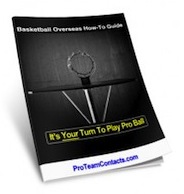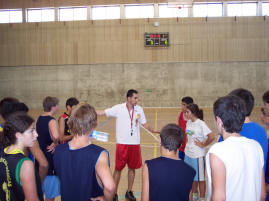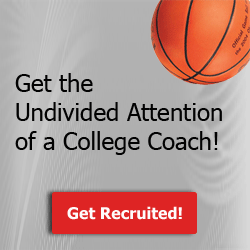I am proud to post, finally a great article about my friend and agent Eric Wiesel. He is an attorney and female basketball agent. I cannot say enough about him but I think from this article you will understand why!
Read more..
Agent makes inroads on WNBA He takes on low-paid women clients because they’re nicer … and loyal
View full article here or read more below
Kelly Johnson Sacramento Business Journal ————————————————————
Like the women he represents, it’s the enjoyment of basketball, not the pay, that drives Sacramento sports agent Eric Wiesel.
Compared to the men’s side of the game, there’s 99 percent less money in women’s pro basketball. But for Wiesel, the rewards that matter rival those of any big-star agent.
Wiesel, 38, is one of about 40 WNBA sports agents nationwide and the only one in the Sacramento region, according to the California Secretary of State’s office. He is also the only local sports agent actively working with clients on any pro team.
Wiesel, a partner in the Sacramento law firm of Matheny Sears Linkert & Long, is relatively unknown among sports agents. He’s been growing his agent business within the law firm for six years. With about a dozen players and one college coach as clients — all are women, and one is a Sacramento Monarch — Wiesel is one of few agents with multiple WNBA clients.
Wiesel says he represents women because they’re more courteous and kinder to work with than men. Some in the industry return the compliment, saying WNBA agents overall are a pretty good bunch themselves.
“There’s not enough money to attract sleazy people,” says Bruce Levy, whose New York City-based firm represents 53 female athletes. “It’s like trying to rob a lemonade stand rather than a bank. If you’re a sleazy agent and want to get rich quick, the WNBA is not the route to riches.”
Levy knows about Wiesel, but hasn’t met him. “I’ve heard good things about him,” Levy says. “I believe he’s an ethical person.”
The average salary for NBA players during the 2003-04 season was $4.1 million. The average for the WNBA is around $50,000, or nearly 99 percent less. The minimum salary is $31,000 and the maximum is $87,000. The agents get up to 5 percent of that as commission, or $2,500 on the average salary.
Wiesel could probably make that much in one reasonably busy week as a lawyer.
But Wiesel is happy: “Being an agent is almost a dream,” he says. “There’s so much good you can do. As an agent I can touch people.”
“If I am unhappy, he will do whatever he can to make me happy,” says Jordan Adams, a client writing in an e-mail from Athens, where she’s playing basketball. “He’s not my agent, he’s one of my best friends. I talk to him about just about everything that goes on in my life! He’s just a great listener and knows the right things to say.”
Adams was drafted 18th overall in 2003 by the Minnesota Lynx, but was not picked to return for the 2004 season.
Wiesel knows his clients’ favorite foods and music, how they like to braid their hair, their rituals before a game.
“I know their friends, their hobbies, what they were like growing up,” Wiesel says.
Proudly referring to several displays in his law office, Wiesel shows newspaper clippings, photos and basketballs signed by his clients. Their stats and accomplishments flow easily off his tongue.
There’s Adams; Rebekkah Brunson, 10th overall in the 2004 WNBA draft, the Sacramento Monarchs’ first pick, and currently playing in Belgium. There’s Pokey Chatman, Louisiana State University women’s head coach.
Wiesel is also an attorney, but not sports agent, for Jerome James, the Seattle Supersonics’ starting center and a former Sacramento King.
In fact, it was James who started it all for Wiesel.
It was James who suggested Wiesel become an agent. Then working full-time as a defense attorney, Wiesel had a client whose friend, James, needed advice handling an unsatisfactory relationship with his sports agent. Wiesel immediately liked James, and James appreciated Wiesel’s guidance.
During their talks, Wiesel mentioned his daughter. James befriended her, surprising Wiesel by flying in to watch the young girl play at her basketball game.
“That’s when I really saw … how much impact they could really make,” Wiesel says.
Another client introduced Wiesel to a WNBA player who needed help. From that point on, Wiesel was hooked on promoting and working with athletes.
He didn’t want to work with just any athlete, especially not the blowhards with swollen egos. “My reputation will be married to them,” he says, both to their ability and to who they are as people.
He wanted to work only with people who had impressed him like Jerome James.
Other WNBA agents say they also seek clients who haven’t gotten into trouble. Players who compete overseas are ambassadors for the firm and the country, says New York-based agent Levy, so it’s important to pick athletes who will be good representatives.
But other agents, well, they aren’t as choosy.
Many agents choose athletes based on the money they can make regardless of character. “Character is not a factor that goes into their selection process,” says James Tanner Jr., a Washington, D.C., sports agent whose law firm represents 36 male and female athletes.
“All of our people,” he adds, “are good people to work with.”
Looking for men: For Wiesel, building his client base was slow. Wiesel wanted clients he’d care enough about to earn his dedication. The only ones he found were women.
“I knew the women were different. They’re not as affected by (the money),” he says. “I’ve found more women I could feel passionate about helping than male players.”
Women athletes are more loyal than men and remain with agents longer, Levy says.
Wiesel does intend to approach some male athletes this coming year.
He looks for clients he’d be proud to leave his daughter with. He needs clients he can always be excited about. They must be willing to do something charitable. If his client has a favorite charity, that charity becomes important to him.
Agents Levy and Tanner encourage charitable giving, but don’t require it. They say giving is a very personal decision.
Obviously, Wiesel also looks for talented players who can play professionally. He starts with most when they turn pro, and looks at some as early as high school.
To protect players’ college eligibility, agents must keep their distance — or at least make no promises — until after the players complete their collegiate game.
“Usually I make contact during the senior season,” Wiesel says. He tells potential clients the agent relationship will be one of their most important relationships during their pro career.
Burger mailer, host, off-court employer: Agents negotiate contracts and endorsement deals and sometimes handle public relations. For free agents, Wiesel tries to find a team that will match their needs and skills. He’ll step in if a team provides his client a bad apartment or car, or if there are clashes with a fellow player.
“I’ve arranged for their pets to go to the vet,” Wiesel says.
He’s mailed an In-N-Out Burger care package to a homesick client. When his clients are playing overseas, he exchanges e-mails with some of them daily, whether it’s to talk about movies, music or anything.
When client Jordan Adams was recovering from a foot injury, she lived with Wiesel and his family, even though she has relatives in Auburn, says mom Carla Adams, who lives in Nevada. Wiesel loaned Jordan Adams a car, set her up at his athletic club, lined her up with a personal trainer to improve her ball-handling skills, and hired her as a legal runner at the firm.
“Eric’s become like a part of the family,” Carla Adams says. “He’s taken such good care of our daughter. Anytime I call him — it doesn’t matter when — he answers.”
The bigger money is overseas: The WNBA allows agents to charge up to 5 percent of their clients’ contract amount — compared to 4 percent in the NBA. There’s no limit for the overseas contracts. Some charge up to 10 percent. Agents also take a percentage of marketing endorsements and speaking engagements.
Wiesel sometimes takes a hourly fee if he doesn’t do much work. If a player is drafted high in the first round regardless of what Wiesel does, he says it’s not fair for him to take 5 percent. He may take nothing. If a player isn’t drafted, Wiesel has a lot of work to do, and says his fee is justified.
None of Wiesel’s clients have paid endorsement deals.
Female basketball players — and their agents — make most of their money outside the United States, says Levy, who says he was the first agent to place a female basketball player overseas 25 years ago.
Some agents will argue that for a salary alone, players don’t need an agent for their WNBA contract, because most salaries are set. In that case, some players are better off paying agents an hourly fee for service, Levy says.
Overseas, though, agents need to handle placement with a team, living arrangements, bank accounts, and ensure that the coach doesn’t hit on his players.
Levy does some scouting and consulting on the side, which are lucrative. But there’s not much money for agents in the rest of it, considering what WNBA players are paid.
Overseas, players make a few thousand dollars a month plus room and board and transportation costs, says Dan Whaley, a Sacramento attorney who previously worked as a sports agent for male and female athletes.
Unless an athlete is a marquee player, he says, an agent is lucky to make $2,000 to $3,000 a year from a female basketball player.
Most are also attorneys: The disparity between the pay of male and female basketball players is frustrating, says Sacramento attorney Johnny Griffin III. His practice included a sports agent division until 2003, when the attorney who handled that work moved on.
Security concerns overseas after the 2001 terrorist attacks scared some athletes off from playing overseas. And agents rely on overseas work to pay the bills, Griffin says.
Brunson, Wiesel’s Monarchs player, says she gets value for what she pays Wiesel. “Eric is very reasonable and understands the pay difference between men and women,” she writes in an e-mail. “With this in mind, he still doesn’t overload himself with clients in an attempt to make up for the difference. He wants to be able to give each one of his clients the individual attention needed to ensure they excel.”
Working solely for female basketball players makes it tough for an agent to earn a living, agents say. Like Wiesel, most also work as attorneys.
Wiesel says he essentially has two full-time jobs, although both his sports agent work and his lawyering work — handling appeals, insurance coverage, product defect and general civil defense — are all on behalf of the law firm. He works at the office from 7:30 a.m. until 5:30 or 6:30 p.m. Of that time, one to three hours are devoted to sports business.
At home, he’ll work three to four hours more on sports agent work. He says he sleeps four to five hours a night. During the WNBA season, he travels at least every other weekend to watch existing and prospective clients.
Hard to do two jobs well, agent says: Agent Levy questions the effectiveness of agents who split their time with other work. What if a player overseas needs her agent and he’s stuck in trial? How does an agent place clients overseas if the agent hasn’t been there before?
“You’re being blind,” he says. “How do you know if you’re putting your player on the right team?”
Levy has the benefit of an established firm with a long history and five experts who specialize in such categories as marketing, administration and travel logistics. He speaks six languages and can read and understand a couple more, and he travels to Europe at least a dozen times a year.
“You can’t be a jack-of-all-trades and do the best job,” he says.
But agents with 100 players can’t be in two places at once, either. No one can drop everything for one client, notes Ken Shropshire, a professor at the Wharton School of the University of Pennsylvania, who has written extensively about the sports industry. He co-authored a book, “The Business of Sports Agents.”
“I think I have a great advantage as an agent and attorney because of the fact that I am both,” Wiesel says. “As an agent, I use and benefit from the skills and knowledge I have gained from being a litigating attorney. … I am used to doing battle for my clients.”
League is losing money: The future of the 8-year-old WNBA remains uncertain, but Wiesel and other agents remain confident that they’ll have work for the long term. The NBA took time to get established too.
The WNBA loses money, and Val Ackerman, league president since the beginning, is resigning in February.
But the league and team owners remain committed, Wiesel says. Besides, the WNBA isn’t the only game in town. There are the overseas teams and the 5-year-old National Women’s Basketball League, for which Wiesel’s client Molly Creamer will play next year.
Female basketball players will always find some forum in which to play professionally, he says.
Wiesel plans to approach male athletes and will consider representing athletes in track, swimming and other sports. “I’m open to anything,” he says.
— view full article







 Your questions have been answered in the definitive guide to Playing Basketball Overseas. Join the newsletter and you will receive the 29 page report that explains how to get started and other tips that I think everyone will enjoy
Your questions have been answered in the definitive guide to Playing Basketball Overseas. Join the newsletter and you will receive the 29 page report that explains how to get started and other tips that I think everyone will enjoy
Hello,
How would I be able to contact this agent?
hello how would i be able to contact this agent?
I am seeking a sports agent. I really have talent being playing elementary school. Couldn’t play in college because of my financial aid didn’t cover for all my classes. I attended wayne state university. I’m a female with great skills everybody says i have skills.Trying to play ball tired of minimum wage when i can do more if I put my mind to it. I’m struggling to help my mother. All i have is my ball and when i’m on court it clears my stressfull mind. In high school i average 12 points, 10 rebounds, 5 assists, as a forward, but im a better guard please help me. My number is (313)332-7706 email ladi_t33@yahoo.com. Thank you for your time.
It’s me again i left out that i have played aau and pal too.
Hi, its Myeshia again & my number is 478-284-1628 just in case he is interested in representing me & want to contact me for more information about me. Thanks
hello, I have been researching on the internet and think it would be very beneficial to have a sports agent to help guide my basketball career. I have worked hard in playing year round basketball. As of right now, I am recovering from ACL knee surgery but plan on being back on the court in July. Please contact me if you would be interested in helping me out and reaching my goal of playing basketball at a college level.